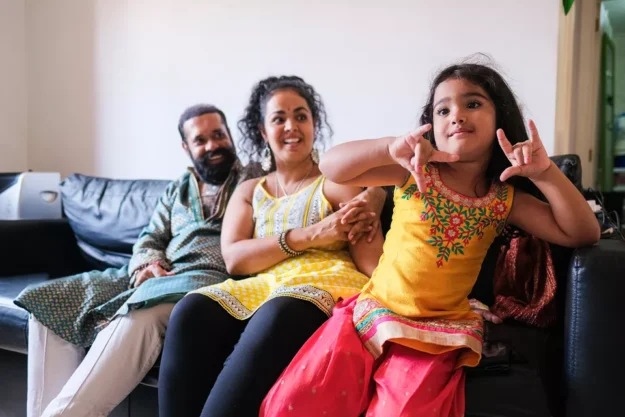What makes fostering a great career choice?
Fostering is flexible, inclusive and above all else, rewarding in a way that few other career paths are. Here are just some of the reasons why fostering might be right for you:
- Change a child’s life
- The chance to work from home
- Earn a generous fostering allowance
- Make a difference to your community
You could be eligible to become a professional foster parent if:
- You are over the age of 21
- You have a spare room in your home
- You have the right to live and work in the UK
- You’re passionate about helping children
You don’t need to own your home to foster, and we welcome people from all backgrounds to join our multifaith fostering agency. Whether you’re a young person, retiree, single or in a relationship, fostering is for everyone, and it’s an excellent career path for anyone who feels a need to make a positive impact on the world.
4 tips for thriving while making fostering your career
-
Explore the different types of fostering
There are many different children in the UK foster system with many different needs— that’s where the different types of fostering come in. From long-term fostering to emergency fostering, there’s so many ways that you can help children in need of a safe family home, and being open to offering more than one type of fostering will broaden your prospects and give you more flexibility.
There are also specialist types of fostering to explore, such as fostering biological siblings, which aims to keep children together during what is often a very challenging time. You might also be interested in parent and child fostering, where you welcome a vulnerable new parent into your home along with their little one. During this time you’ll take a hands-off approach and help them to develop vital parenting skills. By choosing to offer these unique types of fostering, you’ll be helping to keep families together where they might otherwise have been separated.
-
Make space to take care of your mental health
Fostering is far more than just a career path— it’s a lifestyle. Unlike with a traditional job where you’re able to leave the office at 5pm and forget about work until the next day, a foster parent, like any other parent, works full-time, to raise, protect and nurture the children in their care. Because of this huge commitment, it’s important to take steps to care for your emotional wellbeing and mental health.
This can be as simple as making time for yourself to do what’s important to you, like heading to the gym or meeting up for a book club with friends. It’s important to also consider which friends or family members you’ll be able to rely on for support while fostering. Remember you’ll always have the support of ACS, too, from coffee mornings and support groups to expert advice from professionals.
-
Make the most of your training
If you choose to foster professionally, like with any other role, you should always be pursuing excellence and investing in your personal development. Here at ACS, you’ll have access to our in-depth support and training opportunities, and we encourage you to take advantage of these learning opportunities whenever you can.
We offer flexible training, delivered both in person and through online sessions, to suit a busy lifestyle. What you’ll learn in these sessions will give you the tools you need to help children in care recover from their past and go on to lead happier, healthier lives.
-
Become immersed in our vibrant community of support
Here at ACS, we specialise in matching children with families who understand their cultural and faith-based needs. We’re proud to stand for the values of togetherness, embracing our differences and building community. We support our foster parents develop strong bonds with other fostering families, and offer a jam-packed calendar of events for foster parents and children including sports days, charity events and other celebrations.
By getting involved with your fostering community and making the most of what we have to offer, you’ll feel the benefits of community for your own family, as well as helping other foster families as you build bonds, share advice and discover all that fostering has to offer.
Answering common fostering FAQ’s
How much do foster parents get paid?
How much money you’ll be entitled to will depend upon a few different factors, including the types of fostering you choose to offer, how many children you are able to care for and the ages and needs of those children.
Most foster parents are also exempt from paying tax on their earnings from fostering due to the government’s Qualifying Care Relief scheme. Try our calculator below to get an idea of how much you could earn as a foster parent.
What is the fostering assessment process like?
The assessment process to become a foster parent typically takes between 4-6 months. While this may seem like a long time, it’s essential so that we can get to know everything about you and complete relevant background checks.
Once you’ve made enquiries over the phone, you’ll be required to meet with a member of our team who will visit your home for between 1-2 hours to get to know you and your family better. Over the next few months, you’ll take part in training and have visits from a social worker who will assess your suitability to foster. Their findings will then be put before a panel, who will make a recommendation to our Agency Decision Maker here at ACS as to whether or not you should be approved to foster— if you succeed, you’ll then be matched with your first foster child!
Why do I need a spare room to foster?
Every foster child needs a room of their own to help maintain the privacy and dignity of everyone in your home. As well as being clean and safe, your spare bedroom should minimum contain enough space for a cosy bed, a wardrobe or chest of drawers for storing clothes, and space for work and play.
Getting your spare room ready to foster can be a really exciting part of your fostering journey. If you choose to redecorate, a neutral colour palette is recommended so that your spare bedroom can appeal to a range of children and be easily altered to their tastes. You may also decide to invest in some child-proofing equipment such as window guards and stair gates if you plan on taking care of little ones, though you don’t need to worry about getting the room ready until you’re ready to welcome a child for the first time.
Can I hire a babysitter for my foster child?
Even if you’re planning to make fostering your full-time career, there will of course be times when you need someone else to step in and care for your young person. As a foster parent with ACS you’ll receive 14 days of respite, and you may nominate a trusted friend or family member to become your designated foster parent support person to help care for your foster children, providing you have completed these necessary steps before any babysitting takes place:
- Your chosen support person has completed a satisfactory DBS check
- A risk assessment has been conducted by a social worker
- You have received approval from involved social workers, your fostering agency and any other relevant parties







